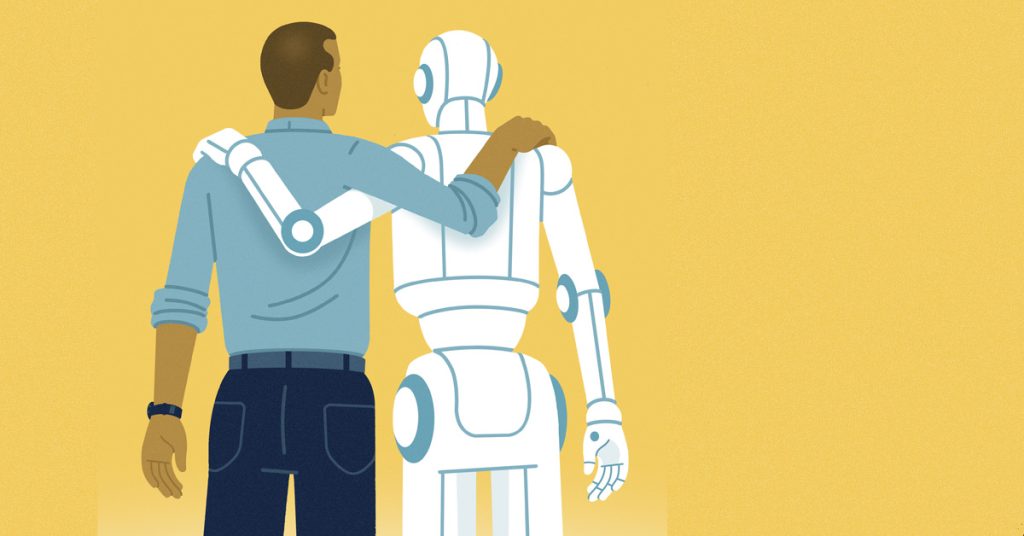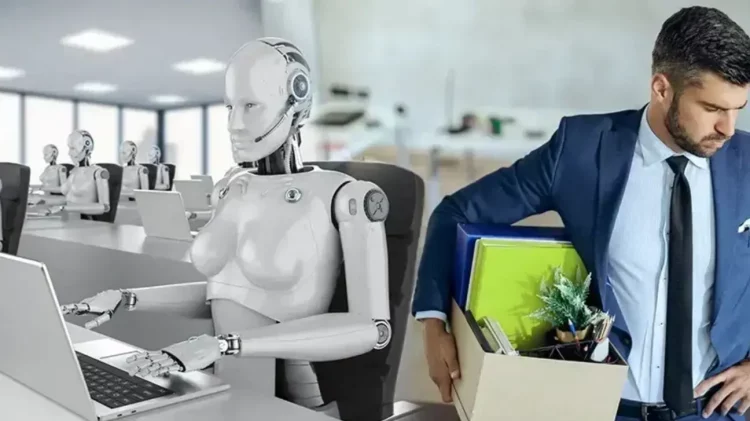The advent of artificial intelligence (AI) is disrupting industries across the globe, creating both opportunities and challenges for businesses and workers alike. As AI becomes more embedded in various sectors, one of the most pressing questions for industry leaders, policymakers, and economists is: how will AI impact the job market? Will it lead to job displacement, or will it create new opportunities? And, more importantly, how can companies, governments, and workers prepare for this rapidly changing landscape?
This article explores the perspectives of CEOs, economists, and thought leaders on the future of work in the age of AI. We will analyze how different industries are adapting to AI’s potential to reshape job markets, the types of skills that will be in high demand, and what both workers and companies can do to thrive in this new environment.
1. AI’s Role in Job Displacement: Myth or Reality?
One of the most common fears surrounding AI is the possibility of widespread job displacement. As AI systems become more capable of performing tasks traditionally done by humans, concerns about automation replacing jobs in industries like manufacturing, retail, and even white-collar professions such as accounting and legal services are gaining traction.
Job Loss in Routine and Repetitive Roles
AI has already made significant inroads in automating repetitive and manual tasks, such as assembly line work, data entry, and basic customer service. In sectors like manufacturing, autonomous robots can now perform tasks such as welding, assembly, and packaging more efficiently and accurately than human workers. Similarly, in customer service, chatbots and virtual assistants are handling routine inquiries and tasks that were once performed by human agents.
Expert Insight:
Dr. Rachel Miller, an economist at the Institute for Future Work, argues that, “AI’s potential to replace jobs in certain sectors is real, but it’s not as straightforward as simply replacing workers. Many roles will evolve rather than disappear entirely, and this will create opportunities for those who can adapt.”
Disruption in Professional Sectors
The impact of AI will not be limited to manual labor. Professional fields such as finance, law, and healthcare are also experiencing significant disruption. AI-powered tools are now capable of performing tasks such as risk assessment, legal research, and diagnostic assistance. While these technologies improve efficiency, they also raise questions about the role of human professionals in the future.
For example, AI can analyze vast amounts of financial data, predict market trends, and even provide personalized investment advice. In law, AI tools can process legal documents, automate contract reviews, and predict case outcomes, challenging the traditional roles of paralegals and junior lawyers.
2. AI Creating New Jobs: A Silver Lining?
While fears about job displacement are valid, AI is also poised to create new roles that did not exist before. These jobs will require workers to possess a unique set of skills, often centered around technology, creativity, and innovation.
New Roles in AI and Data Science
As businesses increasingly rely on AI, there is a growing demand for workers with expertise in AI development, machine learning, and data science. Roles such as AI engineers, machine learning specialists, and data scientists are expected to see significant growth. According to the World Economic Forum, the demand for data-related roles has already surged, and this trend is expected to continue in the coming years.
Expert Insight:
Mark Thompson, CEO of TechFusion, a global AI company, shares, “The rise of AI is not about eliminating jobs—it’s about creating new opportunities that require advanced technical skills. We’re seeing a huge demand for AI talent, from engineers to data scientists, and this trend will only accelerate.”
Human-Centered Roles in an AI-Powered World
Even as automation takes over routine tasks, there are many human-centered roles that AI will not be able to replace. Professions requiring empathy, creativity, and interpersonal skills, such as healthcare providers, educators, and customer relationship managers, will continue to thrive. These roles are likely to evolve with AI support, allowing workers to focus on tasks that require emotional intelligence, critical thinking, and problem-solving.
For example, in healthcare, while AI systems can assist with diagnostics and treatment recommendations, doctors and nurses will remain essential in providing patient care, making decisions, and offering emotional support. Similarly, in education, AI can provide personalized learning tools, but teachers will still be needed to foster creativity, manage classrooms, and build relationships with students.
3. Reskilling and Upskilling: Preparing the Workforce for the AI Future
As AI continues to reshape industries, the importance of reskilling and upskilling the workforce has never been greater. Both businesses and governments must take an active role in preparing workers for the future of work.
Corporate Responsibility in Workforce Development
Leading companies are already investing in workforce development programs to help their employees adapt to new technologies. Many tech giants, including Google, Microsoft, and IBM, have launched initiatives to reskill their employees and provide access to training in areas like AI, data science, and digital literacy. These initiatives help employees transition into new roles within their organizations and ensure they stay competitive in the labor market.
Expert Insight:
“Sustainable workforce development is crucial for AI adoption,” says Laura Jenkins, an economist at the Future of Work Institute. “Companies need to invest in ongoing training programs that equip their employees with the skills required to thrive in a rapidly changing job market.”
Government Initiatives to Bridge the Skills Gap
Governments around the world are also taking steps to address the skills gap. In the U.S., for instance, several initiatives are in place to provide workers with access to affordable training programs and educational resources. Similarly, countries like Germany and Singapore have implemented apprenticeship programs that combine on-the-job training with formal education to help workers transition to new roles in emerging industries.
Additionally, policymakers are focusing on lifelong learning initiatives that provide workers with continuous access to education and training throughout their careers. These programs are essential for ensuring that workers can adapt to the evolving demands of the job market, particularly as AI becomes more prevalent.

4. The Role of CEOs and Business Leaders in Shaping the Future of Work
CEOs and business leaders are at the forefront of the AI revolution, and their decisions will have a profound impact on how the workforce adapts to these changes. Many leaders are already implementing AI in their operations, but they are also thinking about the long-term implications of these technologies on their employees.
AI Integration with a Human-Centric Approach
Industry leaders are recognizing the importance of a human-centric approach to AI integration. While AI is being used to streamline processes and improve efficiency, many companies are ensuring that their employees remain central to the organization’s mission. For example, CEOs are investing in AI tools that augment human decision-making rather than replacing it. This approach allows workers to leverage AI technology while still maintaining a critical role in the decision-making process.
Expert Insight:
“AI can enhance human potential, not replace it,” says David Lynch, CEO of FutureTech, a global AI solutions provider. “We’re working on projects that combine the strengths of both AI and humans, creating a future of work where technology empowers people to do more meaningful and impactful work.”
Ethical AI Adoption
CEOs are also becoming more aware of the ethical implications of AI adoption, particularly when it comes to job displacement. Many business leaders are advocating for responsible AI deployment that includes planning for the social and economic consequences of automation. By adopting ethical AI practices, companies can ensure that the transition to an AI-powered workforce is inclusive and that displaced workers are supported with retraining and relocation assistance.
5. Global Perspectives: How Different Countries Are Preparing for AI’s Impact on Employment
AI’s impact on the job market will vary by region, depending on the level of technological adoption, economic structure, and government policies. Some countries are embracing AI and taking proactive steps to prepare their workforces, while others are facing challenges due to the rapid pace of technological change.
China and the Race for AI Dominance
China has made significant strides in AI development and is aggressively investing in AI research and innovation. The Chinese government is focused on creating a highly skilled workforce in AI and related fields through initiatives like “Made in China 2025” and substantial funding for AI research. However, the rapid pace of automation in manufacturing and other sectors raises concerns about job displacement, especially in traditional industries.
European Approaches: Regulation and Workforce Protection
In Europe, AI adoption is often accompanied by strict regulations that prioritize data privacy and worker protection. The European Union is developing policies that balance innovation with social responsibility, ensuring that workers are not left behind by technological progress. Initiatives like the European Skills Agenda aim to upskill workers in AI and digital technologies to prepare them for new roles.
U.S. Strategies: Focus on Innovation and Job Creation
In the U.S., the focus is on fostering innovation and ensuring that new technologies create jobs rather than eliminate them. Tech companies are leading the charge in reskilling efforts, while government programs are being developed to provide access to AI training and education for workers in displaced industries.
6. The Future of Work: Balancing Automation and Human Talent
Ultimately, the future of work in the age of AI is about finding the right balance between automation and human talent. AI has the potential to transform industries, improve productivity, and create new opportunities, but it also poses challenges that must be addressed. By focusing on reskilling, ethical AI deployment, and fostering innovation, businesses, governments, and workers can navigate the complexities of this new era.
Expert Insight:
“AI will not replace people, but it will change the nature of work,” says Dr. Alan Wright, an economist at the International Labor Organization. “The key to success will be how we prepare people for the new roles that AI will create, ensuring that no one is left behind.”
Conclusion: Preparing for the AI-Driven Job Market
As AI continues to advance, the job market is bound to undergo significant changes. While automation may displace certain jobs, it will also create new roles, particularly in AI development, data science, and other technology-driven sectors. By investing in workforce reskilling, promoting ethical AI practices, and preparing for the unique challenges posed by AI, companies, governments, and workers can ensure a successful transition to an AI-powered future.











































